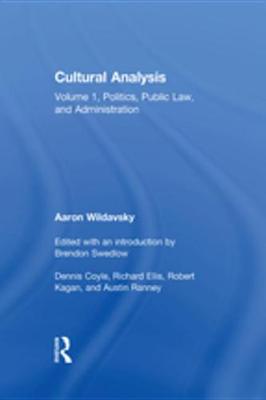As a result of a lifetime of incomparably wide-ranging investigations, Aaron Wildavsky concluded that politics in the United States and elsewhere was a patterned activity, exhibiting recurring regularities. Political values, beliefs, and institutions were neither endlessly varied, nor haphazardly organized. They tended to exhibit a limited range of variation, and were organized in discoverable, predictable ways. In Cultural Analysis, the fourth collection of his essays posthumously published by Transaction, Wildavsky argues that American politics, public law, and public administration are the contested terrain of rival, inescapable political cultures.Analysts of American politics distinguish liberals from conservatives and Democrats from Republicans, but do not explain how these categories of political allegiance develop, maintain themselves, or change. Wildavsky offers a cultural-functional explanation for ideological and partisan coherence and realignment. Wildavsky also felt that these dualisms did not adequately capture the ideological and partisan variation he observed on the political landscape. Like others, he detected another recurring strain of political allegiance: that of classical liberalism or libertarianism. People of this political stripe valued freedom more than equality (the primary political value of contemporary liberals), and also more than order, the primary political value of conservatives.The value of Wildavsky's reconceptualization of the ideological and social foundations of political conflict, compromise, and coalition is assessed here by Wildavsky's former colleagues and students at the University of California, Berkeley: Dennis Coyle, Richard Ellis, Robert Kagan, Austin Ranney, and Brendon Swedlow.
- ISBN13 9781351524612
- Publish Date 6 February 2018 (first published 15 March 2006)
- Publish Status Active
- Publish Country GB
- Publisher Taylor & Francis Ltd
- Imprint Routledge
- Format eBook (EPUB)
- Pages 456
- Language English
